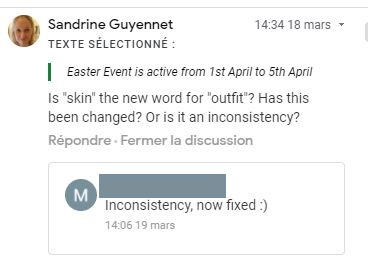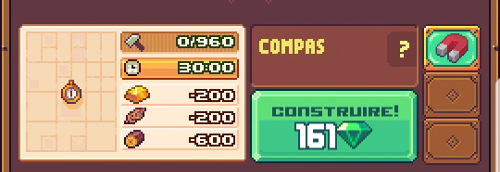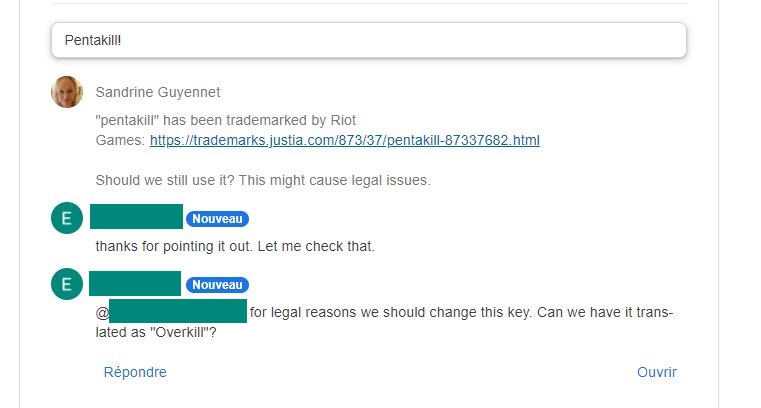Last pair of eyes on source text
One pun to rule them all
Developers should see each of their translators as an extra pair of—extremely picky—eyes. During the translation process, not only do they read the source text, but they analyse each sentence carefully. They have to get the meaning absolutely right. Is there a double entendre? A hidden piece of information for the player? A pun or joke? A reference to a famous film or the latest meme? It’s not as easy as it looks to translate references to pop culture, and it all starts with spotting them. Of course, it’s very helpful if the developer leaves pointers.

References everywhere
Do you have to kill 100 duck-sized horses and one horse-sized duck?
If a translator asks for an explanation about a string because it could be interpreted in two or more different ways, then maybe it would be a good idea to rewrite the source text to make it clearer. Sometimes a slight change of syntax is all that’s needed to remove any possible misinterpretation. Is the “small potato salad” a “salad of small potatoes” or a “small salad of potatoes”? It could be that a mysterious sentence uttered by an NPC is actually the only hint the player gets about the location of the enemy, or that an achievement doesn’t say clearly enough which enemy you have to kill. If the meaning is not conveyed properly, then you might even end up with a bug in the translated game where the player gets stuck.
Is the Axe of fire the same as the Fiery axe?
Translators will also spot inconsistencies within the game. It’s very confusing for players if a given unit is called “soldier” in the main game, “warrior” in the first update, and “paladin” in the list of quests. It’s even worse if the name of a weapon you pick up changes whether you see it in the inventory, in the achievements, or in the tutorials. If you give the build to the translators, they might also see some strings in-game that are missing from the text files, possibly because they were hard-coded.

Can I get some context please?
This is the question translators ask all day, every day of their lives, like desperate multilingual parrots. Context is everything to translators. In dialogues, they need to know who is talking to whom for grammatical reasons (agreement) and to get the tone right. In menus, they need to know on which platform you want to publish your game in order to use the correct system messages and to allow you to pass compliance tests. They need to know how the game mechanisms work, the gender of the characters, which type of bat you are talking about (flying mammal or wooden implement?), whether the spring is a source of water or a wire coiled spirally.

“Compass” is translated as “instrument for drawing circles” instead of “instrument that indicates magnetic north”.
Are you sure Mega Corporation™ lets you use their trademarks?
It’s always nice to mention other games that you love, or the toys from your childhood, but you never know when someone is going to sue you for using a trademarked name. Translators might spot these issues.

Better safe than sorry
First pair of eyes from the target market
The translator is usually the first native speaker from the target market who is going to read your game’s text in its entirety. They are immensely familiar with the history, popular culture, and latest news of their own country. It’s an essential part of their job.
Are you sure you want to antagonize potential customers?
What if you make a joke in your game about chickens, and how they are not brave and only deserve be stewed with peas and carrots, but then the translator is horrified and tells you that in their country, chickens are a divinity and eating one is seen as eating a family member? Or if your translator tells you that a joke won’t work and might be shocking, you should believe them. What is deemed acceptable in some cultures, and might even be funny, could be horrible elsewhere. Society is constantly evolving and matters that were considered laughable a few years ago are now taboo. Think about the TV show Friends and how cringey it is to watch it today and try to avoid attracting a bad buzz.

Ouch!
Should I use “poo” or “sh*t”?
Your translator will also advise you on target country rules and regulations, and is able to tweak the language used in order to fit classification requirements (PEGI, ESRB, etc.).
What does {0} stand for in this string, please?
It might seem easier to build the text from little pieces assembled like Lego blocks, using variables to allow for a bit of variety, but this is hell from a localization point of view. It’s sometimes hard to guess what variables stand for. For example: “Kill 3 enemies in {0}” could be “Kill 3 enemies in Cherrytown” or “Kill 3 enemies in 2 minutes”. Variables also cause numerous grammar issues, and sometimes developer input is needed to solve them: adding separate strings for singular and plural, changing in which order some strings are triggered, etc.

In the last line, is it “Get 8 Event items” or “Get Easter Event items”?
Tips for translators
Or: how be inquisitive without being annoying
- If a sentence sounds strange, if something doesn’t feel right, there’s probably hidden meaning in there.
- Research first, ask second. The text might be similar to a film or game title, but not exactly identical, in order to avoid legal issues. Look for famous jokes and memes.
- If you are in contact with the translators working in the other languages, ask them. We all have different backgrounds and specialist knowledge. When the QA file is shared online, sometimes no developer input is needed as the translators can figure things out between themselves.
- Be nice. Their game is their baby. Don’t say it’s ugly. Maybe mention that it could be prettier with a matching outfit.
- Don’t be afraid to ask questions. Developers are happy that you care about their game. You both want the final product to be good and sell well. Ask whatever you need to know in order to produce a good translation and help them polish the source text while you’re at it.
- But don’t ask a million questions either. Developers don’t want their inbox full of notifications, and they don’t have all day to reply. Send questions in batches every day, or try to group them by topic. Avoid asking similar questions several times, or repeating questions asked by other people.
- Don’t criticize the translation agency either, even if the legacy translation is awful. PMs might be reading.
- If you get no reply from the developer, or if you get non-replies like “just translate the source text”, move on. You mentioned the issues, you offered to fix them, you did your best.
 English
English French
French
